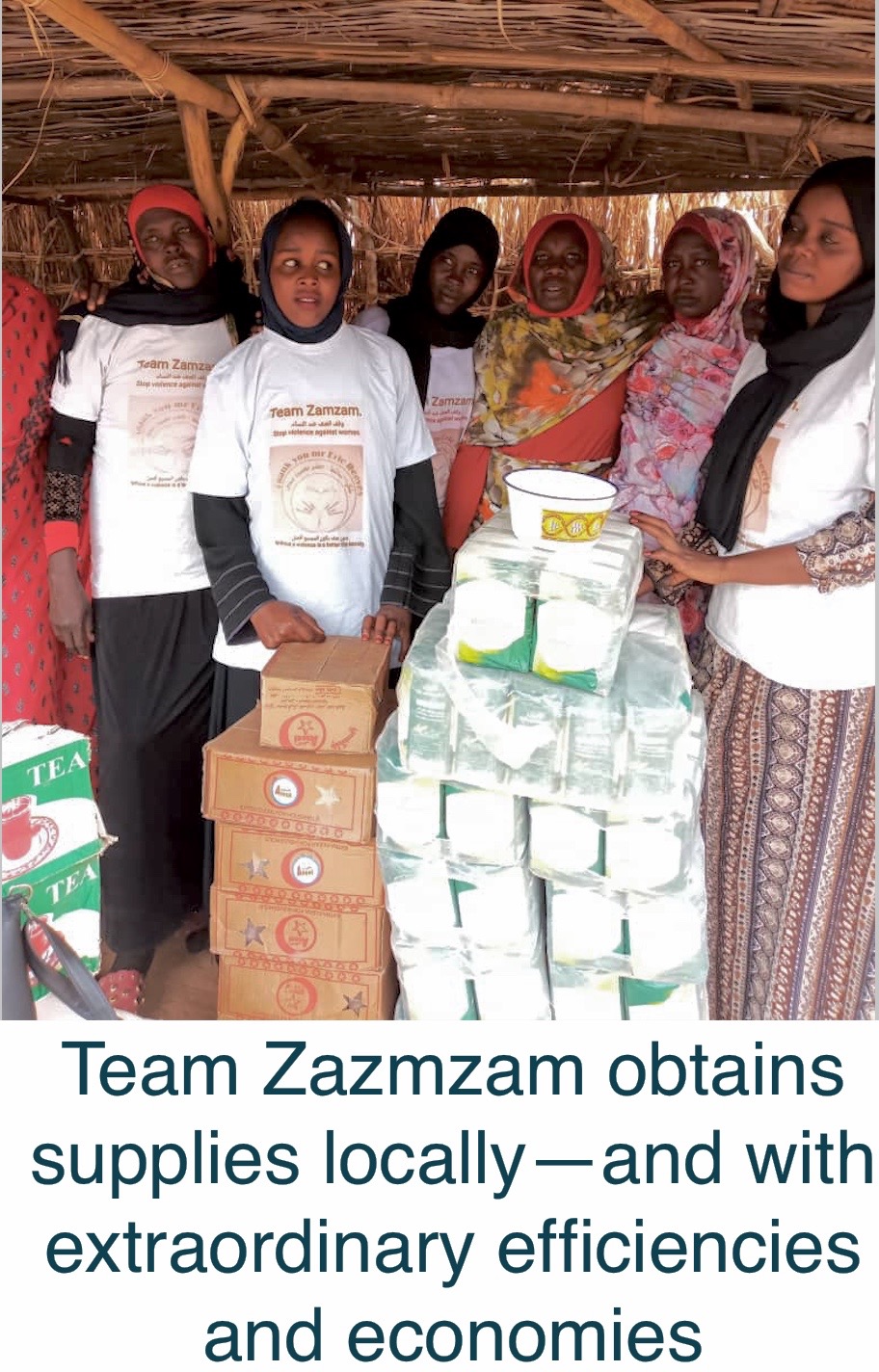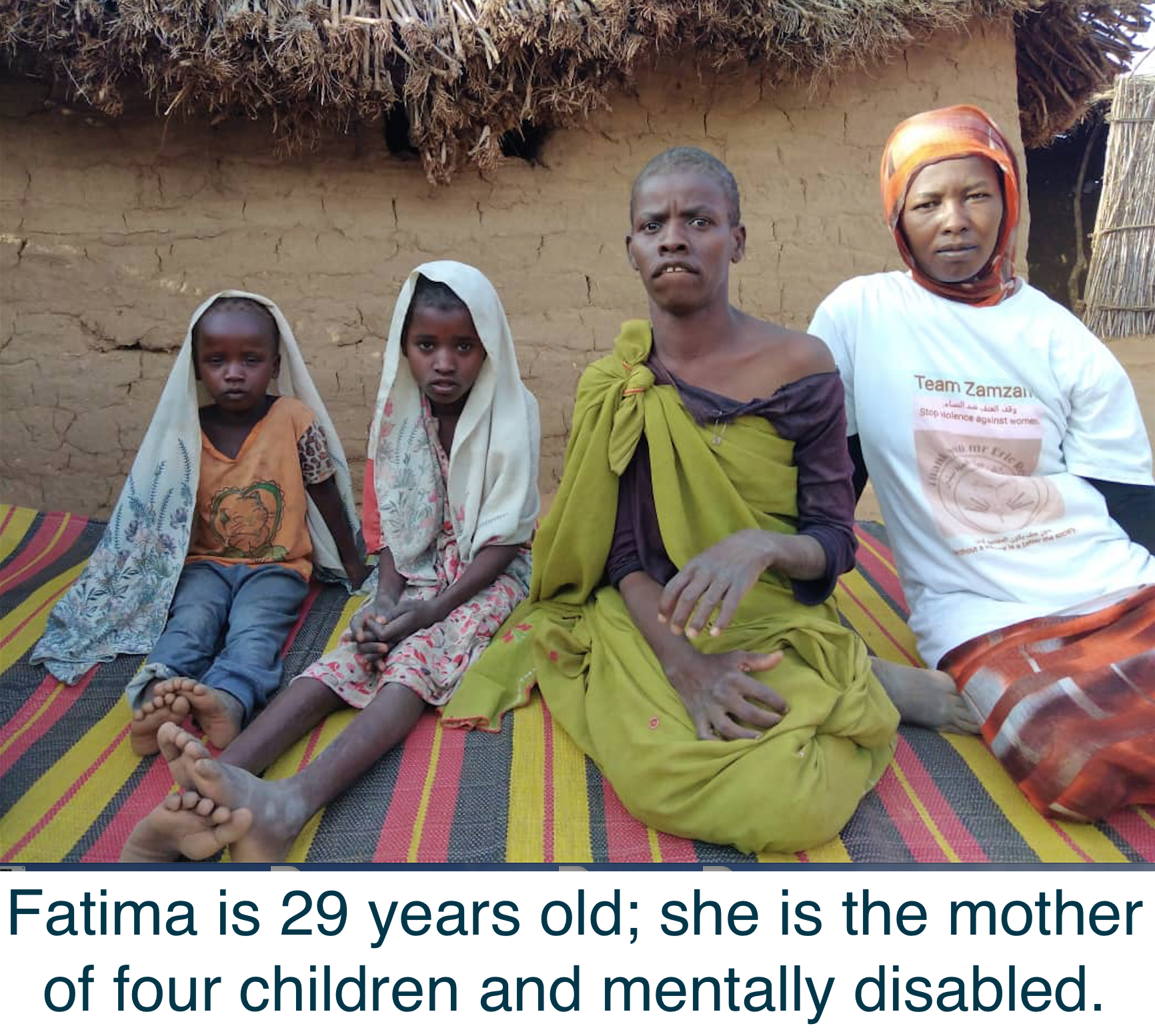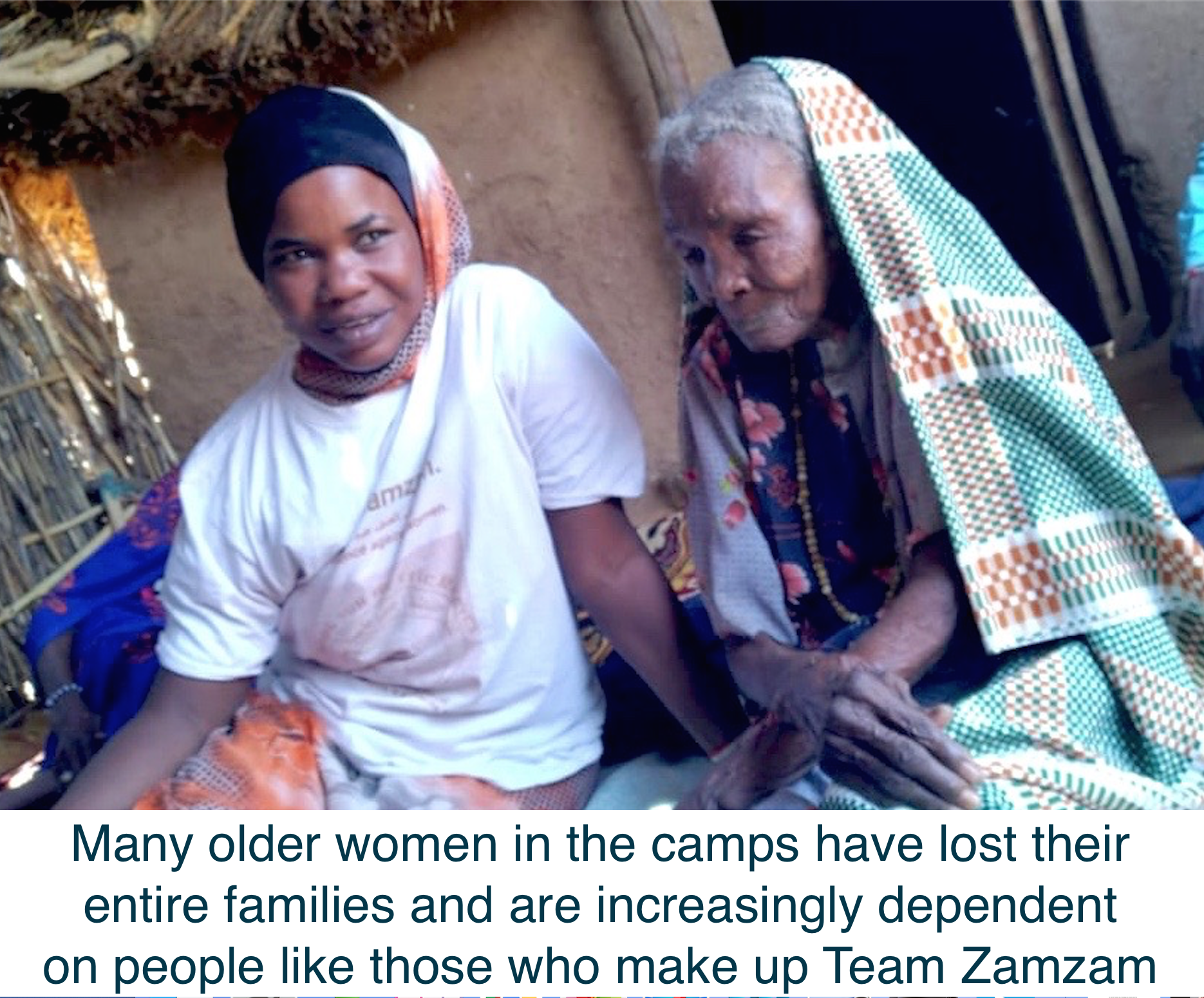Gaffar Mohammud Saeneen and Eric Reeves, Co-Chairs | Julie Darcq, Online Campaign Coordinator
Overview (Eric Reeves)
Our continuing, indeed growing project in Zamzam IDP camp (North Darfur) has reached a number of milestones over the past month. Four women received successful surgical repairs of debilitating, even crippling fistulas; an additional psychosocial counselor has been added, along with a third man to provide security. And indeed, security for the counselors as they go about their work has become a pressing concern: we are still in the planting season and girls and women leaving Zamzam camp to attend to their farms in rural areas are at greatly increased risk.
The focus of attention in these rural areas has been in the Dar El Naiem region, roughly twenty-five miles east of El Fasher (there are a great many remote villages there, many of them oblivious to all news, political and medical). Counselors returned to the region again this month, and were enthusiastically welcomed back. There is sadly much work to be done among people who have no humanitarian assistance, are largely illiterate, and bear so many of the searing scars of genocidal counter-insurgency, particularly brutal sexual violence directed against girls and women.
The successes if May in Dar El Naiem have significantly increased this month, and there have been no incidents of violence against the counselors. They have identified more girls and women with fistulas, and the most debilitating cases will be transported to El Fasher for surgery. We had four wonderfully successful surgeries in June. With additional funding, we plan to have seven fistula surgeries in July, which will bring the total to almost 20 since the project’s inception. Sadly, the waiting list for surgery only grows longer (currently over 70 girls and women), and difficult choices about priority continue to be required.
The testimonials of women who have had successful fistula surgeries are perhaps the most gratifying of reports received from Team Zamzam (for a brief account of what a fistula is, see here). Here are two examples, the first suggestive of how important counseling is in conjunction with surgical repair:
[Testimonial from 23-year-old Mouniera M.]
“I feel so lucky that I can’t describe my feelings. All I have wished for three years is that there would come a day when I can sleep without a pain. Because of this pain, I lost my chances of getting married. I cried a lot in silence alone, and I was isolated even from my family; my neighbors and friends looked on me as if I’m less. People talk behind my back and say ‘oh, she cannot find husband because of this and that.’ Now I’m more than fine, I’m happy, full of joy, and my life is back.
“Most of the people don’t know what we are going through. It’s very difficult to live on with pain if everyone thinks it’s your fault—it wasn’t! I used to think it was all my fault until sisters from Team Zamzam helped me with talks to come to this realisation. I was only fifteen years old when this stuff happened to me. Not only me alone, most of those I met at talk sessions are suffering from same problem. I thank God and pray for those who helped me.”
[Testimonial of a second fistula patient]
“When one of the sisters of Team Zamzam came to tell me that I have been chosen for medical treatment, I thought initially that she was kidding with me; but then she repeated the news. [I was doubtful because] I never thought in my life that one day I will go to see a doctor. I wasn’t even thinking of medical consultation. I simply cannot afford it. Last year a friend of mine told me that it costs too much money.
“Al-Hamdoulihai [thank God], I feel much, much better and my pain is disappearing day by day and I feel very strong now and soon I go around to do many things. This illness has denied me of many things for so long and people always look at me as if I’m suffering from AIDS or something and this is what has broken my heart all this time. Now I can tell all of them that I’m not suffering from what they think of. Those who helped me to recover, I don’t know what to say but many thanks to you for help.”
But it is important to stress that the most important work, which has now helped well over 1,000 girls and women in Zamzam camp and various rural areas, is psychosocial counseling. And the results can be as dramatic and life-transforming as surgery:
[Testimonial of Macka B.]
“I’m from village of Tabeldeyat in the area of Shangil Tobay [about 35 miles south/southeast of El Fasher]. I don’t know my real age but I’m somewhere between 37 and 41. I never went to school in my life. How should I know the counting? Last year Arabs of camel herders attacked me and my 17-year-old daughter while we were working in our farm. Three of them want to do their dirty stuffs on my daughter and I fought back. It was a big fight and if my arm had not been broken in the fight, I could have easily stopped them by fight. I wasn’t scared of their guns, but my arm was broken.
“From that day, my daughter’s life has totally changed, she became aggressive, and so many times I have stopped her from hurting herself by razors; she lost her taste for everything in life. After the Eid of Ramadan [mid-May I brought her here to the sisters of Team Zamzam and thankfully she is now recovering well. She is feeling much better than two months ago and I want her to come here very often to learn things from her sisters.”
[Testimonial of Arafa Hamied A.]
“My name is Arafa Hamied A.; I’m 21 year old now. For 10 years I have lived here in Zamzam camp with my mother, three older sisters, and one young brother. I have been raped twice by the Janjaweed. First time I was only 11 year old and I can clearly remember what happened to us in that rainy season in our farm. I think of that day, and I experience emotional breakdowns. What breaks me down is the crying voice of my mother. She was badly beaten, unconscious, before our eyes by five strong men.
“The second time it was two years ago while I was on the way with friends to fetch firewood. This second time it was very painful but they slapped me hard on my face and I stopped fighting back. After this last incident, I went through a very difficult time. I couldn’t sleep for nearly one year. I lost too much weight, was frightened of going out, and lost confidence in everything and everyone.
“I have tried to interact with people I know, but every time I tried I felt as if they are laughing at me. I lived like this for long time until the sisters of Team Zamzam came to help me. When they came to see me the first time I didn’t want to talk but they kept coming back to see me again and again, and after fourth time I talked to them. After this everything went well, I didn’t expect that they would understand what I have been through, but thank God they helped me a lot in getting to stand on my feet. They have not only helped me to be strong but they have encouraged me and taught me how to help others. I came to see them more than twenty times now and they nicknamed me the ambassador, and I love it much.”
Ominously, reports of Covid-like symptoms and deaths are significantly increasing in El Fasher and Zamzam camp. Vaccinations are months if not years away, and social distancing is impossible. The wearing of masks is the only practicable prophylactic measure, and counselors wear masks, provide masks, and offer rudimentary information about the nature of Covid-19.
Psychosocial counseling:
One may gather a sense of how active Team Zamzam is from reports of the number of counseling sessions reported for a single week by coordinating counselor Fatima:
From 13th June to 21st June:
Number of counseling sessions:
33 group counseling sessions in Dar Al Naiem
63 individual counseling sessions in Dar Al Naiem
38 group counseling sessions in Zamzam camp
84 individual counseling sessions in Zamzam camp
Total: 71 group counseling sessions
Total: 147 individual counseling sessions/private talk sessions.
Number of repeat visits:
28 victims returned 2 times in Dar Al Naiem
15 victims returned 3 times in Dar Al Naiem.
52 victims returned 2 times in Zamzam camp
19 victims returned 3 times in Zamzam camp
As I noted in the May update, one feature of the project that should be highlighted is the role of our monthly distribution of funds in providing livelihoods for many of the counselors, most of whom were formerly without employment (which continues at staggering levels throughout Sudan—especially in Darfur, and especially for women and girls). Employment, even with very modest salaries, has been life-changing for many of the counselors themselves: they are able to feed their families; they have a strong sense of purpose; and they share the benefits of an exceptionally close-knit community.
The also are the means by which supplies are distributed to the most needy: feminine hygiene kits, food for the most impoverished as well as widows with children and the disabled; sanitizing soap; masks (the “delta variant,” which will inevitably reach Sudan and Darfur, is a terrifying prospect—and the counselors are among the only sources of reliable medical information in the vast, extremely crowded camp).
The coordinating counselor (Fatima) continues to provide regular updates to Gaffar, who translates them and transmits them to me (I edit them very light for clarity). It is impossible to overstate how efficient these distribution means are, especially since the entire project has absolutely no overhead costs: all funds received from donors and woodturning purchases go to salaries for counselors and security personnel, fistula surgeries, and supplies.
For this past month, Fatima has provided various updates on counseling sessions and distributions (as well as information about the four highly successful fistula surgeries):
June beneficiaries (June 1 – June 12):
74 families in Dar El Naiem (167 persons)
67 families in Zamzam camp (154 persons)
Total: 141 families
Total: 321 persons
Categories of beneficiaries of this distribution:
33 families caring for people with disabilities/handicapped, mentally disabled persons
13 families caring for blind persons
42 families of isolated mothers taking care of orphans
19 families caring for very elderly people
25 families that are deeply impoverished 
Other essential necessities:
42 boxes containing women’s cotton, toothpaste, shaving razors and shaving creams
Infliximab pills (antibiotics for urinary tract infections common among women with fistulas)
3 boxes of therapeutic art supplies
Beneficiaries:
42 victims of sexual violence
27 patients of fistulas for the medicine
23 people benefited from art supply materials
Additional information from Team Zamzam and photographs of the counselors at work may be found at this Annex.
(Previous updates are archived at: https://www.ericreeves-woodturner.com/blog/ )
(To provide help for our project, see | https://www.ericreeves-woodturner.com/gallery/ )

